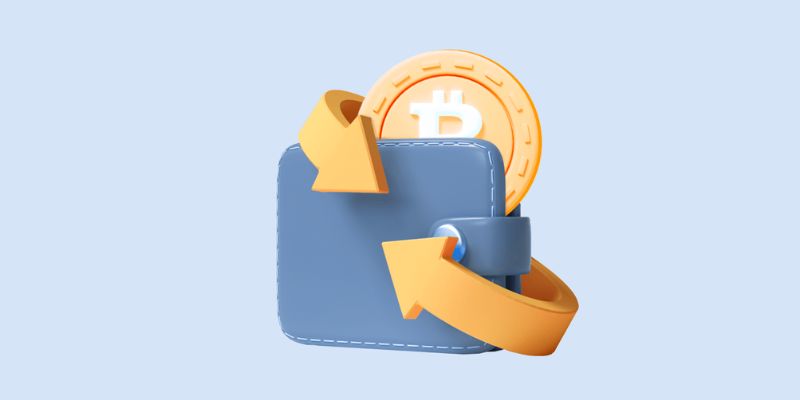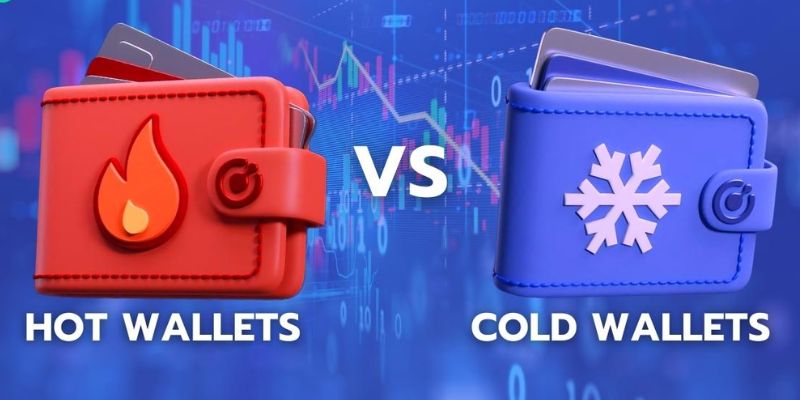As you dive into the digital currency world, you’ll face the crucial choice between hot vs. cold crypto wallets. Each carries its own set of perks and downsides. I’m here to guide you through the advantages and disadvantages of different crypto wallet types. A hot wallet keeps your digital coins at your fingertips, ready for quick transactions. But with ease comes worry – are you exposed to hackers? On the flip side, cold wallets offer a safe haven, like a digital Fort Knox, away from internet threats. Yet, what if you need quick access or lose your physical backup? Deciding on the right wallet is about balancing your need for secure storage against the ease of everyday use. Let’s dissect these options and arm you with the knowledge to secure your digital gold.
Understanding Hot vs. Cold Wallets: The Basics
Types of Cryptocurrency Wallets
Let’s chat about types of cryptocurrency wallets. You’ve got two main kinds: hot wallets and cold wallets. Hot wallets are like leather wallets. They’re super handy for quick spending – just like grabbing cash for a soda. But unlike leather wallets, they’re online, which puts them at risk of cyber-thieves.
Cold wallets are more like safety deposit boxes. Tough to crack, they store your crypto offline. Think about it like keeping your gems far from sticky fingers. They’re not as easy for paying on the fly, but they defend your coins like a fortress.
So, we’ve got hot wallets that are all about easy access but face online dangers. Cold wallets, on the other hand, are the gold standard in safety but not the best pals of convenience.
The Spectrum of Wallet Security Measures
Diving deeper into wallet security, imagine a big, colorful rainbow. At one end, we have hot wallets – glowing with comfort but shadowed by threats. Despite this, security steps can help. Two-factor authentication, tough passwords, and staying alert can make a big difference.
Now, slide to the other end. Here lie cold wallets, shining with armor, safe from cyber battles. Hardware wallets shine brightest with robust features. They’re like unbreakable boxes, shrugging off attacks. But remember, even the strongest safe needs a smart owner. Losing your hardware wallet means saying bye-bye to your crypto.
Then we have paper wallets – kind of like secret maps to your treasure. They work offline, keeping your cryptos hidden. Yet paper can tear or burn. It’s a balance, right? USB wallets are another cool pick. They’re simple, you just plug them in, and hey, you’re good to go!
Our crypto journey is all about choices. Want fast and handy? Choose a hot wallet. Prefer a fortress for your digital gold? Go cold.
Web-based, mobile, desktop, software – there’re all sorts of wallets. We just need to pick what fits our life and our nerves. Do you want to dash and dine with mobile wallet convenience, or sleep sound at night with cold wallet safety?
Crypto wallet backups are lifesavers. Lose your phone in a cab? A backup has your back. It’s like knowing someone’s there to catch you if you stumble. With wallets, always have a plan B, or even C!
Remember, each wallet sings its own tune. Exchange wallets hum with multi-currency wallets but beware the bass of exchange wallet drawbacks. Wallet compatibility with cryptos might sound like sweet music today, but it’s the solid rhythm of securing crypto transactions we need for a stress-free tomorrow.
And here’s an insider tip: understanding crypto storage is your power-up in the game of crypto. It’s all about being clever with your keys and keeping your cool, whether your wallet’s hot or not. So, get smart, stay sharp, and keep your crypto treasure locked down just right!
Pros and Cons of Hot Wallets: Is Accessibility Worth the Risk?
Hot Wallet Accessibility and Online Wallet Risks
Ever wonder how a hot wallet works? Imagine it like your pocket. It’s easy to reach in and get your coins, right? In the digital world, hot wallets are like that. They let you use your cryptos fast. Let’s talk shop now. Your hot wallet lets you buy and sell with a tap. That’s why folks love it.
But easy access comes with risks. A hot wallet is always online. So, sneaky hackers can try to get in. When you think about keeping your coins safe, that’s a big “uh-oh.” You always want to make sure the door’s locked, so to speak. That means, good security habits are key.
Hot Wallet Disadvantages and Hacking Threats
Here’s the deal. Hot wallets can be targets. Hacking threats are real. Imagine leaving your coins out on a table. Someone could grab them, right? Well, it’s like that but digital. Hackers look for small cracks to slip through. They’re keen on hot wallets because they’re right there on the net.
The big bummer is, if they get your coins, they’re gone. Poof! Not all hope is lost though. You can use secret codes, called encryption, to make hacking tough. It’s like having a super secret handshake that only you and your wallet know.
Two other big words you should know are “multi-signature” and “two-factor authentication.” Think of multi-signature as a lock needing two keys instead of one. Two-factor authentication is like asking for your secret handshake and a password. Both are cool tricks to keep your stuff safe.
What about when you’re not using your coins? Should you leave them in a hot wallet? Maybe not. Hot wallet disadvantages can sting. If you’ve got a good stash of coins, you might want to use a cold wallet for some. Cold wallets are not hooked to the net. This makes them much safer, like a safe at home.
To wrap up, hot wallets are handy but risky. They’re great for fast buys and day to day stuff. Yet, it pays to know the risks. Hackers are like bugs at a picnic. Don’t let them get your goods. Be smart and use those security tricks. They can save you a lot of trouble.
Remember, staying safe in crypto is all about balance. Both wallet types have their place. It’s like having shoes for running and boots for hiking. Pick the right one for the job. And hey, being careful means you can enjoy the crypto ride without worry. So, get out there, have fun, and keep your coins tight!
The Fort Knox of Crypto: Navigating Cold Wallet Solutions
Cold Wallet Safety and Offline Wallet Benefits
Cold wallet safety is key for peace of mind in crypto. Unlike hot wallets, cold wallets stay offline. This means they are far from hackers’ reaches. Think of cold wallets like a safe for your digital cash. They’re perfect for holding crypto for a long time. No internet equals fewer risks.
Types of cold wallets vary—hardware, paper, USB devices. Each carries its strengths. A hardware wallet, like a small USB stick, holds crypto offline. It locks your private keys away from the online world. Paper wallets, printed keys, offer simplicity in offline storage.
Offline wallet benefits are many. They shield against online threats and are immune to hacking attacks. Hardware wallets, especially, are built to resist physical damage. Even if your computer is infected, your crypto stays safe.
But safety comes with a cost—convenience. Cold wallets lack the instant access hot wallets provide. This means it takes time to transfer funds from cold to hot when needed.
Cold Wallet Vulnerabilities and Insurance Options
Even cold wallets have weak spots. What if you lose them? Damage them? Forget a password or lose a paper wallet? These missteps can lock you away from your own crypto.
For these vulnerabilities, insurance may come in handy. It helps cover losses from theft or damage. But, it’s not widespread yet. Few providers cover crypto, and the terms can be strict. It’s wise to pick a well-known hardware wallet with a solid backup option.
Through encryption and backups, you can guard against these risks. Encrypt your wallet data. Create backups for your hardware wallet. Always have a plan in case the worst happens. Ensure you understand the backup and recovery process fully.
Remember, while cold wallets are Fort Knox for digital cash, they need smart handling. Store them in a secure place and keep backup details safe and separate. Learn all you can about your chosen wallet’s features and recovery options.
In all, cold wallets are our best bet for long-term crypto storage. They give top-notch security and peace of mind. Understanding how to use them and handle vulnerabilities makes your crypto journey safe.
Securing Your Digital Treasure: Strategies for Optimal Wallet Protection
Secure Crypto Transactions and Multi-Signature Wallets
Protecting your crypto starts with safe transactions. Each trade must be tight as a drum. Imagine locking a vault with several keys. Multi-signature, or “multi-sig,” wallets are just like that. They need more than one key to open. That means if someone gets hold of one key, they can’t swipe your coins. This layers up your defense.
Multi-sig wallets are good for groups too. They work like a safety deposit box. Nobody can access it alone. It’s a team effort. You control who has a say. You can trust this method more than single-signature wallets. That’s because the risk of one person losing a key or going rogue is too high. We keep things safer with multi-sig.
Here’s the dish – a hacker has to work way harder to break into a multi-sig wallet. They’d need several keys, which is no small feat. If they get one, they’re still out in the cold. It’s like a treasure hunt, but the map’s split into pieces. And they don’t have all the pieces.
Key Management in Wallets and Wallet Recovery Options
Your keys are your crypto kingdom’s gatekeepers. Lose them, and you’re out of luck. That’s why key management is a big deal. Think of it like hiding spots for your cash. You wouldn’t want to forget where you put them. Write down your keys. Keep them hidden. But also make sure you can find them when needed.
Did something happen to your keys? Well, we’ve got a backup plan. Wallet recovery options are like a spare key to your car. Most wallets give you a seed phrase when you set them up. This is a list of words that you have to keep hush-hush. If you lose your keys, these words are your get-out-of-jail-free card.
But remember, you have to keep these words safer than your favorite toy. If someone else finds them, they could take a joy ride with your crypto. You don’t want that, and neither do I. Seed phrases are powerful. With great power comes great responsibility. So, handle with care.
Storing your crypto isn’t just about picking a wallet. It’s about understanding each type’s pros and cons and matching them to your needs. You’ve got to stay on your toes because the crypto world is wild. But with the right know-how, you can keep your digital treasure locked down tight and sail the crypto seas like a pro.
In this post, we’ve explored the key details of hot and cold wallets. I’ve shown you that hot wallets are like keeping cash in your pocket—easy to use but not the safest. On the flip side, cold wallets are like a safe in your basement—tough to get into, which means they’re super secure. We know hot wallets are always online and convenient, but hackers like them too. So, remember, there’s always a risk. Now, cold wallets? They’re safe from most online attacks, but they’re not perfect. You can’t just forget your password or lose the device.
When you’re choosing how to keep your digital coins safe, think about what fits your life. You might choose a mix of both wallet types to balance safety and easy access. Stay sharp when you’re doing crypto transactions and consider all the tips I shared on how to keep your wallets locked down tight.
Remember, in the world of crypto, taking the right steps to protect your money is just as important as making it. Be smart, be safe, and always stay informed about the best ways to secure your digital treasure.
Q&A :
What are the key advantages of using a hot crypto wallet?
Hot wallets are digital wallets that are connected to the internet, which makes them easily accessible and convenient for users who perform frequent transactions. Advantages include:
- Ease of access: Hot wallets can be accessed through various devices with an internet connection, including smartphones and computers.
- User-friendly interface: They often provide user-friendly interfaces that help beginners navigate the world of cryptocurrencies easily.
- Quick transactions: Hot wallets are ideal for trading and other transactions that require quick access to funds.
- Wide variety of options: There’s a vast selection of hot wallet providers, offering different features tailored to diverse user needs.
Remember, since they are connected to the internet, they are more vulnerable to online threats such as hacking and phishing.
How do cold wallets provide enhanced security for crypto assets?
Cold wallets are cryptocurrency wallets that are not connected to the internet, which greatly reduces their vulnerability to cyber attacks. Advantages include:
- Improved security: Cold wallets are less susceptible to unauthorized access, hacking, and other online threats because they are offline.
- Full control over funds: Users have complete control over their private keys and thus their funds, without reliance on third-party services.
- Protection from unauthorized transactions: Since cold wallets are offline, they cannot be used to transfer funds without physical access.
However, it’s important to note that the enhanced security also comes with less convenience, as accessing funds requires additional steps compared to hot wallets.
What are the typical disadvantages of hot crypto wallets?
While hot wallets offer convenience and ease of use, there are certain drawbacks:
- Security concerns: Hot wallets are more vulnerable to online threats due to their constant internet connection.
- Risk of losing assets: If the hot wallet provider faces technical issues or goes out of business, you may risk losing access to your assets.
- Reliance on third parties: Often, hot wallets are hosted by third parties, which exposes users to potential risks if these services are compromised.
It’s essential to choose a reputable wallet provider and employ strong security measures such as two-factor authentication.
Can cold wallets be used for regular crypto transactions?
Cold wallets are primarily designed for the secure storage of cryptocurrency rather than frequent transactions. They are best suited for a “crypto savings account” rather than a “crypto checking account,” which you might associate with hot wallets. One can still perform transactions with cold wallets, but the process is more cumbersome and time-consuming, making it less practical for day-to-day trading or purchasing.
What factors should I consider when choosing between a hot and cold crypto wallet?
When deciding between a hot and cold wallet, consider:
- Frequency of transactions: Frequent traders might prefer hot wallets, while long-term investors might lean towards cold wallets.
- Amount of crypto being stored: Large amounts might be safer in cold storage, while smaller, transactional amounts can be kept in hot wallets.
- Risk tolerance: Users with a low tolerance for risk may favor the security of cold wallets.
- Usability: Hot wallets offer more convenience and accessibility.
- Cost: Some cold wallets, like hardware wallets, can be more expensive initially than free hot wallets.
Balancing these factors with your personal crypto needs will guide you to the right wallet choice.



